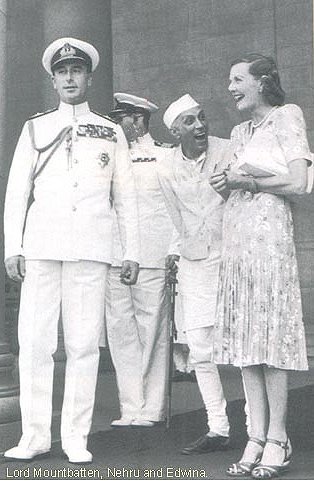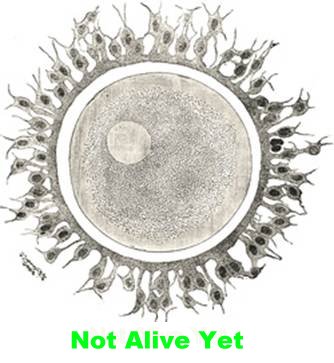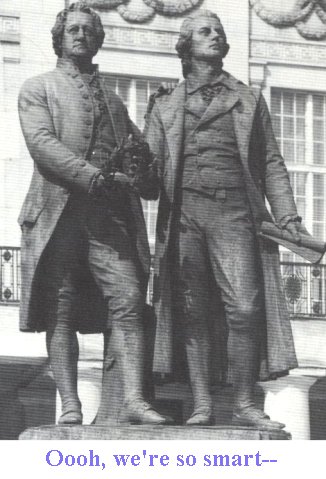

¶ And yet we may conceive what others deem prejudice by long thought and experience. “When I find I have been mistaken,” said John Stuart Mill, “I change my mind. What do you do?”
¶ Unless it grabs the mind, the heart, and the spirit, all three, it isn’t music. But that’s too stuffy. People short one or more of these organs make the loudest music.
¶ And while we’re on the topic: Music was degraded by its use as an accompaniment to the most dreadful atrocities, as when at the notorious Belsen Concentration Camp the SS men employed as guards formed an orchestra of prisoners of seven nations, amongst the occasions on which it had to play being those on which hundreds of women had to stand naked for hours whilst waiting for the selection of those to be gassed or burned alive. --Percy Scholes, Oxford Companion to Music (1970), s.v. "Germany and Austria."
¶ “FIGHT VIOLENCE”—recent Pakistani peace march slogan.
¶ ¶ Now we know how democracy works. Fools elect fools. ¶ Odd sign? ‘Tis a pilcrow, I trow [Middle English, from Old English trEowan; akin to Old English trEowe faithful, true -- more at TRUE]. And whence [Middle English whennes, from whenne whence (from Old English hwanon) + -s, adverb suffix, from -s, genitive singular ending; akin to Old High German hwanAn whence, Old English hwA who]? Now hear the OED: [App. for pilled crow: cf. pilcorn, pilgarlic, etc. The application of the word, with the form pylcraft, has suggested that it originated in a perversion of PARAGRAPH, through pargrafte, *parcrafte, etc.: cf. quots. c1460 and 1617. But the history of the word is obscure, and evidence is wanting.] = PARAGRAPH n. 1. A symbol or character (now usually ¶ or [reversed,]) formerly used to mark the commencement of a new section or part of a narrative or discourse; now, sometimes introducing an editorial obiter dictum or protest, and sometimes as a reference to a marginal note or foot-note.
Its original use is common in Middle English MSS. (where the form is often a red or blue [computer-disdained blob]). It was retained by the early printers, and remains in the Bible of 1611 (but only as far as Acts xx), no doubt because every verse begins a new line, so that the method of indicating a paragraph by ‘indenting’ (as done by Tindale, Coverdale, and the Revisers of 1881-5) was not available. [1500 Ortus Voc., Paragraphus, Anglice, a pargrafte in writing.] c1440 Promp. Parv. 398/1 Pylcrafte, yn a booke..asteriscus, paragraphus. c1460 Medulla in Way Promp. Parv. 398 note, Paragrapha, pylcraft in wry[t]ynge. 1573 TUSSER Husb. (1878) 2 In husbandrie matters, where Pilcrowe ye finde That verse appertaineth to Huswiferie Kinde. 1602 R. T. Five Godlie Serm. 18 To stand as a Cypher in Augrim, or as a pilcrow in a latine Primmer. 1617 MINSHEU Ductor, Pilkrow, contractum videtur corruptumque ex paragrapho. a1625 FLETCHER Nice Valour IV. i, But why a Peel-crow here?.. A Scar-crow had been better. 1706 PHILLIPS, Pilcrow, an old Word for a Paragraph. 1897 S. S. SPRIGGE T. Wakley xv. 141 The leading article..calling attention to them with interjections..and all sorts of verbal pilcrows. No, I didn’t try to rephlogisticate all the links. Had enough already, haven't you?
¶ If you speak English, and especially if you don’t, you should read
You can tell that generations of my family, and god knows who else, have been digging around in this (now my) tattered copy since it hit the best-seller list.
¶ A portable anecdote, for now, has T.H. Huxley on shipboard with a high clergyman.
“Well, Thomas,” says the prelate, pointing to the ship’s monkey cavorting overhead, “one of your ancestors, I presume?” “Possibly,” retorts the famed biologist, “and it has this consequence, that I can change my opinions, when I find I have been mistaken, something Your Lordship, descended from the angels, cannot do.”
¶ For all you ape-brained yahoos indignantly trying to blame it on Darwin, he never said any such thing as you preach:
¶ Life begins at conception? From what? Ex nihilo? ¶ Many of our legal and ethical principles depend on the separation between Homo sapiens and all other species. Of the people who regard abortion as a sin, . . . many are unthinking meat-eaters, and have no worries about chimpanzees being imprisoned in zoos and sacrificed in laboratories. . . . It is no use saying to these people that, depending upon the human characteristic that interests you, a foetus can be ‘half human’ or ‘a hundredth human.’ . . . Absolutist minds can be a menace. They cause real misery, human misery. This is what I call the tyranny of the discontinuous mind. –Richard Dawkins, “The Ancestor’s Tale,” 304.
¶ No, I don’t like abortion. But with wise guidance it can save lives. Our highest reproductive duty is to prevent the need for it, and if God and the pope don’t like that, to hell with them both.
¶ Heine, dying:—Bien sûr, il me pardonnera; c’èst son métier.
¶ Now imagine the locomotive’s first huff back down into the smokestack. Come on, you can do it. From there to the cylinder, where the closing piston compels the steamcloud back across the phase transition, from water droplets to vapor. The train backs up one piston stroke. The transition heat crosses the boiler tube walls to the combustion products in the firebox, which revert to free oxygen molecules and a high-grade carbon fuel. While shedding much more piston-reconstituted fuel, the carbon rides back in the coal car to the mine, into deep underground veins, which in turn rise anti-eonwise to emerge as lush forest. From the stomata of its leaves the carbon comes out as CO2, reunited with its oxygen friend, in the process emitting by photodesynthesis the energy that had bound it. These photons whizz back to the sun, burrow through its outer spheres to cross the fusiopause and put enough voltage back into the helium atoms to unfuse them into hydrogen again. Pretty soon the hydrogen cools off and spreads out as molecules astray in space. But they keep whirling backward, getting hotter and closer together hypergeometrically, until there's nothing left but infinity. We have regressed what would amount to about 136 hundred million earthrides backward around the sun. That sounds like a lot, but put it in dollars and it would hardly buy you a small war. Okay, hold the presses on that piece of foolishness until you go read Ambjørn, Jurkiewicz, and Loll, "The Self-Organizing Quantum Universe", Scientific American, July 2008, 43-49. They get their computer to simulate the "dynamical emergence of a four-dimensional universe of essentially the correct physical shape from first principles" only by making it use a one-way time dimension. Their trains and wars have to go forward, like real ones. Well, we can say we knew that all along, but now we're starting to find out why. ¶
At table. Cindy (boss) serves curry. ¶

What I cannot tolerate is foolishness. What do we wish to make of our country? Do we want to make it a nation of brave people or a nation of sheep who would run helter skelter on the advice of astrologers? What is all this? --Jawaharlal Nehru, speech, 6 Sept. 1951; in Judith M. Brown, Nehru, 193.
But we must not fall into the error of supposing that the early progenitor of the whole Simian stock, including man, was identical with, or even closely resembled, any existing ape or monkey. — Descent of Man I, 199.
It's far worse. Your Grandpa Ape would be shocked:
As the class of fishes is the most lowly organised and appeared before the others, we may conclude that all the members of the vertebrate kingdom are derived from some fish-like animal, less highly organised than any as yet found in the lowest known formations. The belief that animals so distinct as a monkey or elephant and a humming-bird, a snake, frog, and fish, &c., could all have sprung from the same parents, will appear monstrous to those who have not attended to the recent progress of natural history. For this belief implies the former existence of links closely binding together all these forms, now so utterly unlike. — Descent of Man, 203.
Monstrous, eh? For those of us who have been paying attention, you have yet to rise above the lowest slime mold imaginable.
 The gene pool is highly mutable but essentially immortal. The evanescent, accidental metazoan diploids of the various lineages have only one natural purpose: to mate and pass on life. The fundamental, continuous life form of the gene pool is the haploid gametes, shown partying above.
The gene pool is highly mutable but essentially immortal. The evanescent, accidental metazoan diploids of the various lineages have only one natural purpose: to mate and pass on life. The fundamental, continuous life form of the gene pool is the haploid gametes, shown partying above.
We are still hunting for some physical law that would prevent this sort of thing. Maybe there isn’t one. Maybe somewhere trains and wars back up, sgnab gib gnitcurtsnocer.
Devon (teen): What’s this?
Cindy: Sweet potato.
Devon: Looks like apple or somethin.
Cindy: It’s sweet potato.
Me (writers are allowed to use objective case in implied complement position): C’mon, c’mon . . .
Devon: Oh, I was gonna save some for you if it was—
Me: Sure. Never mind, c’mon—
Devon: Oughta be some big bloody chunks of lamb—
Me: Grff. Here, want some crab?
Devon: (grunts) Big shank of lamb in one fist, like . . .
Me: Like this (manfully ripping up Paralithodes camtschaticus leg)—
Devon: (falsetto, flapping wrists) That’s gay.
Me: Whaddya mean (gnawing on claw)—
Cindy (falsetto): Eww—
Devon: Like you can hit somebody with—
Me: Hey, this was a pretty big leg before I tore it off—
Cindy (falsetto) Eww, whap him with a crab—
Editor: Here endeth the reading. Amen.

¶ Elias Canetti wrote a lot of Aufzeichnungen—jottings, or—hah!—Canettiditties. A scary one I recall imagines a clique of blind, who prowl the streets, gather unpredictably on corners, raise their striped canes in unison and chant ominously, Pretty soon everyone, including the police, is steering clear of them. Canetti could have saved himself the trouble of writing Masse und Macht and still deserved his Nobel.
¶ Goethe (bet you can’t pronounce it) turned out bons mots by the shelfload, of course. Here’s one I like:
Der Aberglaube gehört zum Wesen des Menschen und flüchtet sich, wenn man ihn ganz und gar zu verdrängen denkt, in die wunderlichsten Ecken und Winkel, von wo er auf einmal, wenn er einigermaßen sicher zu sein glaubt, wieder hervortritt. – Superstition, essentially human, flees, when one thinks to suppress him entirely, into the queerest corners and crannies, from which, when he suspects it’s safe, he suddenly emerges.
¶ Okay, how about a prize for something cuter than Goetheditties? Um, there already is an entry. When Goethe decided about 1795 that Schiller was worth getting chummy with,

they started spearing their lessers with a torrent of vicious epigrams. They called them Xenien, but couldn't claim the label. The obscene satirist (or satirical obscenist) Marcus Valerius Martialis had invented them 1750 years earlier. In age, Goethe (Schiller then long dead) tempered his with his trademark tolerance and wisdom, calling them zahme (tame) Xenien, but it's the böse (wicked) ones that live on.
¶ Ask us what makes things the way they are, and God beats probability by a tsunami. I suspect that American respondents feel a distinctly chilly climate when straying too far off the ruling orthodoxy and so fudge, maybe more than a bit. But there’s more to it than that. Confronting science, the average American resorts to exactly the opposite from what Richard Feynman said is its motive force, the pleasure of finding things out (go read the so-titled collection of his essays).
¶ Evolution is now universally accepted as a fact by thinking people. --Dawkins, Ancestor's tale (2004), 308. Okay, now let's get a good poll on "Do you think?"
(Gallup poll, Feb. 2009) As Darwin is being lauded as one of the most important scientists in history on the 200th anniversary of his birth (Feb. 12, 1809), it is perhaps dismaying to scientists who study and respect his work to see that well less than half of Americans today say they believe in the theory of evolution, and that just 55% can associate the man with his theory. Naturally, some of this is because of educational differences. Americans who have lower levels of formal education are significantly less likely than others to be able to identify Darwin with his theory, or to have an opinion on it either way. Still, the evidence is clear that even to this day, Americans' religious beliefs are a significant predictor of their attitudes toward Darwin's theory. Those who attend church most often are the least likely to believe in evolution, and most likely to say they do not believe in it.¶ Finally, we may conclude that when the principles of evolution are generally accepted, as they surely will be before long, the dispute between the monogenists and the polygenists will die a silent and unobserved death. — Darwin, Descent of Man (1871) I, 235. 'Tis a consummation devoutly to be wished.
¶ While we’re on the topic, In outlining courses of reading for refugees, Miss [Jennie M.] Flexner [Readers’ Adviser, NYPL] tries to slip in literary antidotes for what she has discovered are the three great misconceptions about this nation: (1) that gangsters lurk on every hand, making it dangerous to venture out after dark, (2) that political graft is rampant in every department of the government, and (3) that one must never discuss politics where there is any danger of being overheard. (from “Talk” section of Sept. 1940 New Yorker; quoted by Philip Hamburger, Friends Talking [1999], 7.)
| Isoprejudices | Paraprejudices | Hyperprejudices |
| Back to Index | ||